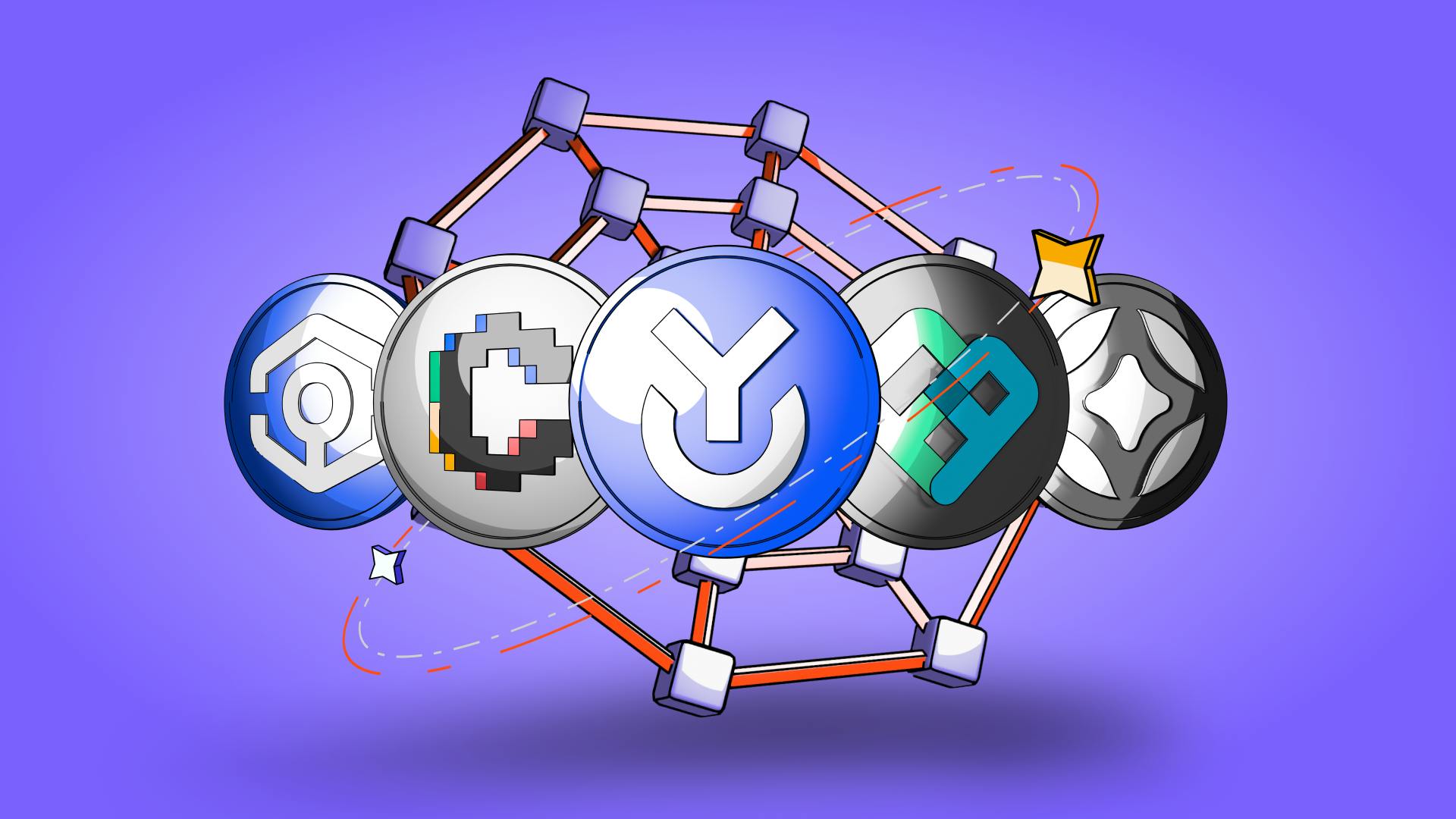The Growth of DeFi: Notable Platforms and Their Contributions
December 5, 2025

by Kamil S
December 5, 2025
Decentralized Finance, or DeFi, represents a groundbreaking shift in the financial landscape. It's a collective term for various blockchain-based financial services and applications that aim to disrupt traditional financial intermediaries, making financial services more accessible, efficient, and open to everyone. In this blog, we'll delve into what DeFi is all about and focus on five notable projects and their contributions.
At its core, DeFi refers to a range of financial services – from lending and borrowing to trading and yield farming – built on blockchain technology. Unlike traditional banks and intermediaries, DeFi operates autonomously through smart contracts. These self-executing contracts automatically enforce the terms of agreements, removing the need for central authorities like banks. This decentralized approach means that DeFi platforms are accessible to anyone with an internet connection and provide greater transparency, security, and control over your financial assets.
DeFi's significance in the crypto world cannot be overstated. It brings the ethos of blockchain – decentralization, transparency, and inclusivity – to the financial sector. DeFi projects enable users to lend, borrow, trade, and earn interest on their crypto assets without relying on traditional financial institutions. This financial independence opens doors to the unbanked and underbanked populations worldwide, revolutionizing the way people access financial services. Moreover, DeFi fosters innovation by continuously pushing the boundaries of what's possible in the crypto space, driving blockchain adoption to new heights and providing services not found with traditional finance.
DeFi's success rests on several fundamental pillars:
Decentralized Exchanges (DEXs): These platforms facilitate peer-to-peer trading of cryptocurrencies without the need for intermediaries. Users maintain complete control and ownership of their assets, enhancing security and autonomy.
Lending and Borrowing: DeFi lending protocols allow users to lend their assets and earn interest or borrow assets by collateralizing their holdings.
Yield Farming: Yield farmers lock up their crypto assets in DeFi protocols to earn rewards or yield. It's a way to maximize returns on idle assets. Projects like Yearn Finance or Convex Finance have pioneered yield optimization.
Stablecoins: Stablecoins like DAI, USDT, and USDC provide price stability and are essential for various DeFi activities.
Staking: Staking allows users to lock up their cryptocurrencies to support the network's operations, secure the blockchain, and earn rewards in return. While staking is a crucial aspect of DeFi, it relates to blockchain networks in general, not only to DeFi applications exclusively.
Decentralized Finance Oracles: Oracles feed real-world data into smart contracts, enabling DeFi protocols to interact with external information accurately. Chainlink is a prime example.
These core pillars underpin the DeFi ecosystem, driving its rapid growth and shaping the future of finance.
We're about to dive into the intricate workings of five standout projects, each contributing its unique angle to the DeFi landscape. From the world of perpetual contracts and yield optimization to decentralized lending solutions and governance tokens, these projects have set their sights on transforming the way we interact with finance. Freshly listed on Coinmetro Exchange, we’re talking about: Perpetual Protocol (PERP), Stargate Finance (STG), Yearn.finance (YFI), Convex Finance (CVX), and Ankr (ANKR).
These five DeFi projects collectively represent the dynamic and transformative nature of the decentralized finance ecosystem. Each project contributes uniquely to the DeFi landscape, ranging from yield optimization and innovative staking mechanisms to trading derivative contracts. As these projects continue to evolve and shape the DeFi space, they play pivotal roles in driving financial inclusion and pushing the boundaries of decentralized finance, ultimately making it more accessible, versatile, and user-centric. Their contributions underscore the ongoing expansion of possibilities within DeFi, highlighting its potential impact on the future of finance. Let’s have a closer look at each one of them.
Perpetual Protocol (PERP) revolutionizes derivative contract trading with a commitment to trustlessness, reshaping how traders interact with financial markets. Unlike traditional financial systems that rely on intermediaries and centralized institutions, PERP operates solely through meticulously written code within smart contracts.
At its core, PERP employs a robust ecosystem of smart contracts initially deployed on the Ethereum blockchain. These smart contracts form the backbone of the platform, governing and executing essential functions for derivative trading. However, in response to the challenges posed by Ethereum's high gas fees, PERP strategically transitioned to xDAI (Gnosis Chain) in 2020. Subsequently, in 2021, Perpetual Protocol introduced Perp v2 on Optimism, effectively closing the v1 protocol on xDAI. The PERP token, an ERC-20 asset, plays a pivotal role in the Perpetual Protocol ecosystem, residing on the Ethereum blockchain.
What truly sets PERP apart is its unwavering commitment to trustlessness. In a world where financial transactions often necessitate trust in specific entities or individuals, PERP shifts the paradigm. Users of the Perpetual Protocol place their trust exclusively in the code governing the smart contracts. This means that every trade executes precisely as intended, free from external manipulation or interference, ensuring a level playing field for all participants.
Drawing inspiration from the success stories of decentralized exchanges like Uniswap and innovative synthetic asset platforms such as Synthetix, PERP ventures into leverage trading. Unlike platforms designed for spot trading or exposure to real-world assets, PERP focuses on perpetual contracts - derivative contracts without expiration dates. This groundbreaking approach empowers traders to take both long and short positions while experiencing minimal slippage, making PERP exceptionally well-suited for leverage trading.
PERP embraces the innovative Automated Market Maker (AMM) model, popularized by platforms like Uniswap. In this model, users trade against liquidity pools instead of relying on traditional order books. Liquidity providers contribute assets to these pools, allowing traders to buy or sell derivatives directly against the pool's liquidity. This approach not only improves efficiency but also reduces dependence on centralized order-matching systems, creating a more decentralized trading experience. Here’s more about how the Perpetual Protocol works:
- The funding rate mechanism deployed by PERP ensures that perpetual contracts align with the prices of their underlying assets. This mechanism automatically adjusts the funding rate based on prevailing market conditions, thereby preventing significant price discrepancies and ensuring a fair and accurate trading environment.
- Liquidity providers play a pivotal role in the PERP ecosystem by adding assets to liquidity pools. In return, they receive fees generated from trading activity. The ample liquidity in these pools helps maintain tight spreads and minimizes slippage, providing traders with a seamless and efficient trading experience.
- The PERP token, with a fixed supply of 150 million, is an essential component of the Perpetual Protocol ecosystem. It offers a range of utilities and unique attributes that enhance the platform's functionality and value. These utilities include governance participation, fee payment, incentives for liquidity providers, staking opportunities, and collateral for trading.
In summary, Perpetual Protocol (PERP) represents a leap in decentralized finance (DeFi), providing traders with an innovative platform for trustless derivative trading. Its core principles of trustlessness, commitment to perpetual contracts, and seamless integration with DeFi technology make it a sought-after player in the evolving DeFi landscape.
Stargate Finance (STG) is an omnichain-native asset bridge and liquidity transport protocol that
that aims to provide inter-connectivity, decentralization, security, and fast cross-chain transactions within the larger blockchain landscape. Unlike many other cross-chain solutions, Stargate simplifies DeFi transactions, allowing users and decentralized applications (dApps) to seamlessly transfer and swap assets between different blockchains, layer-2 networks, and various DeFi protocols with almost instantaneous execution.
One of Stargate's standout features is its ability to facilitate transfers between several different chains, including Ethereum, Avalanche, Polygon, Metis, Arbitrum, Optimism, and Fantom. This cross-chain compatibility significantly broadens the scope of asset movements in the decentralized ecosystem.
Transfer: Stargate enables 1:1 native asset transfers cross-chain, granting users access to the protocol's unified liquidity pools. The most notable aspect is the instant guaranteed finality of these transfers. When a transfer is initiated on the source chain, it is ensured to be executed on the destination chain, providing users with confidence and reliability in their cross-chain transactions.
Pools: Liquidity providers can contribute to Stargate's omnichain protocol by adding liquidity to the system. In return, they earn stablecoin rewards for every Stargate transfer. This incentivizes users to provide liquidity to the protocol and participate in its growth.
Yield Farms: Stargate liquidity providers can also participate in yield farming by staking their LP (Liquidity Provider) tokens, which yields them STG token rewards. This feature not only enhances the protocol's liquidity but also rewards those who actively contribute to its ecosystem.
What sets Stargate Finance apart from many other DeFi projects is its unique approach to handling cross-chain transfers. While most cross-chain bridges rely on fractured liquidity, which necessitates separate pools for tokens passing through the bridge, Stargate uses a lock+mint and burn+redeem mechanism. This process involves the burning of tokens on the source chain and the creation of new tokens on the destination blockchain, ensuring immediate and indisputable finalization of transactions while unifying liquidity. Additionally, Stargate employs a novel resource balancing algorithm known as the delta algorithm to further optimize its cross-chain bridging capabilities.
The STG token serves as the native currency within the Stargate ecosystem and offers various use cases, including:
Staking: STG holders have the opportunity to lock their tokens, a process known as staking, which allows them to earn veSTG. Staking not only provides a means for participating in governance decisions but also rewards long-term stakers with increased staking rewards, fostering greater engagement within the Stargate ecosystem.
Governance: As mentioned above, veSTG received through staking can be utilized for voting on protocol upgrades and decisions, ensuring the community's involvement in the project's development.
In essence, Stargate Finance stands out in the world of DeFi by simplifying cross-chain transactions, offering instant guaranteed finality, and providing a unified liquidity pool that addresses the blockchain trilemma. The STG token plays a pivotal role in the ecosystem, allowing users to stake for governance rights and participate in the protocol's growth and decision-making.
Yearn.finance (YFI) is a decentralized finance (DeFi) platform and cryptocurrency designed to maximize yield, provide liquidity, and offer decentralized governance. Originally launched on Ethereum and later expanded to other blockchains like Fantom, Yearn.finance has played a notable role in shaping the DeFi landscape.
At its core, Yearn.finance is renowned for its innovative strategies in yield farming and DeFi optimization. The platform's developers continually explore new opportunities and partnerships to enhance yield generation, making it a pioneer in the field of automated yield farming. The sustainability of Yearn.finance's ecosystem is ensured through the YFI token, which rewards users who contribute assets and actively participate in governance decisions.
Yield Optimization: Yearn's primary purpose is to maximize yield for its users. It achieves this by automatically moving funds among various DeFi protocols to find the most lucrative opportunities for yield farming, lending, and liquidity provision. Users deposit their assets into Yearn's vaults, and the protocol handles the rest, actively managing the funds to generate the best possible returns.
Liquidity Provision: Yearn.finance plays a vital role in providing liquidity to decentralized exchanges and lending platforms. By participating in Yearn's vaults, users contribute liquidity to the DeFi ecosystem, facilitating trading and lending activities while earning rewards in return.
Decentralized Governance: YFI holders have governance rights within the Yearn ecosystem. They can propose and vote on changes, upgrades, and strategies for the platform. This decentralized decision-making process ensures that Yearn.finance remains adaptable and responsive to the needs and preferences of its community.
Innovation: Yearn is known for its continuous pursuit of innovation in DeFi. It has introduced novel concepts like "yield vaults," which automate yield generation and profit optimization for users. This commitment to innovation has made Yearn.finance a driving force in shaping the DeFi landscape.
The YFI token, Yearn.finance's native governance token, stands out for its unique distribution model. Unlike many other governance tokens, YFI had no initial pre-mine or token sale. Instead, it was entirely distributed through yield farming, making it one of the first projects to embrace this decentralized distribution approach. YFI has a fixed supply of 30,000 tokens, with the majority of these tokens already in circulation.
Yearn.finance distinguishes itself through its core emphasis on yield optimization, liquidity provision, and automated strategies. While other DeFi projects excel in various aspects of the ecosystem, Yearn.finance's unique value proposition lies in its commitment to enhancing returns for users and its decentralized governance model, allowing the community to shape its future.
Launched in mid-2021 on the Ethereum blockchain, Convex Finance focuses on optimizing yield generation for users participating in various DeFi platforms. Its core functionality revolves around interacting with Curve Finance, a leading stablecoin automated market maker (AMM) on Ethereum.
Users can deposit Curve Finance LP (liquidity provider) tokens into Convex Finance, earning rewards in the form of vote-escrowed veCRV tokens. These veCRV tokens grant governance rights and yield-boosting capabilities. The platform excels in optimizing yield by compounding earnings and employing sophisticated DeFi strategies, all while minimizing risks.
Yield Optimization: Convex Finance specializes in maximizing yield, allowing users to make the most of their crypto assets by strategically allocating and compounding their holdings for consistent and sustainable growth.
Integration with Curve Finance: Its integration with Curve Finance enhances Curve rewards and governance participation, adding value to the Curve ecosystem.
Community Governance: CVX token holders actively participate in the protocol's governance, ensuring that it evolves in line with community interests and adapts to the changing DeFi landscape.
Risk Mitigation: Convex Finance's strategies minimize risks associated with yield farming and liquidity provision, helping users reduce exposure to potential vulnerabilities.
The CVX token's price is influenced by various factors:
Total Value Locked (TVL): An increasing TVL signifies growing trust and utility within the DeFi ecosystem. As of October 2023, Convex Finance boasts a TVL of $1.861 billion.
Protocol Upgrades: Significant upgrades, like Gauge Integration and the Convex TriCrypto Strategy, attract more users and capital.
Yield Farming Rewards: Short-term trends may be influenced by yield farming incentives and rewards, including CVX tokens, CRV tokens, or other governance tokens earned by providing liquidity to Curve Finance pools.
Market Sentiment: Market sentiment, influenced by news, social media, and broader cryptocurrency trends, can impact price movements.
DeFi Ecosystem Dynamics: Trends within the broader DeFi ecosystem can affect CVX's performance and adoption.
Convex Finance is expected to maintain its position in yield optimization within DeFi. Collaborations and integrations with other DeFi protocols may expand its services and user base.
Competition in the DeFi landscape includes Yearn Finance and Balancer, each offering different approaches to yield optimization and liquidity provision. Convex Finance's ability to innovate and adapt will be pivotal for its future success in this dynamic landscape.
Ankr (ANKR) is a Web3 infrastructure and cross-chain decentralized finance (DeFi) platform designed to simplify the process of participating in blockchain ecosystems, making it accessible and cost-effective for both individuals and developers. With a focus on node infrastructure, staking, and blockchain services, Ankr offers a range of solutions that set it apart from traditional cloud providers and DeFi platforms.
Node Infrastructure: Ankr simplifies the process of launching and managing nodes on Proof-of-Stake (PoS) blockchains. Traditionally, running a node required significant hardware investments and technical expertise. Ankr removes these barriers by providing an easy-to-use platform where users can deploy nodes for various blockchains with just a few clicks. Node operators pay a monthly fee to Ankr for services, including performance monitoring to ensure nodes remain operational and honest.
API Services: Ankr's infrastructure includes a range of APIs, allowing developers to access blockchain data and execute code across numerous blockchain platforms. This simplifies the development of decentralized applications (dApps) by eliminating the need to navigate complex documentation. Ankr's API solutions accelerate implementation timelines, providing timely and accurate data to dApps.
StakeFi: Ankr's StakeFi service makes staking and validation accessible to individuals with varying levels of technical proficiency. Rather than requiring users to stake large amounts of cryptocurrency and manage validator nodes themselves, StakeFi allows users to stake smaller amounts, which are automatically routed to pools with the highest yield. The platform is non-custodial, ensuring users retain control of their assets. In return for their participation, users receive a synthetic token and additional rewards that can be used within decentralized finance applications and protocols.
ANKR, the native cryptocurrency of the Ankr platform, plays a pivotal role in facilitating various transactions and services. ANKR serves as a means of payment for utilizing Ankr's services, including node deployment and API access. Additionally, it functions as a governance token, allowing ANKR holders to participate in platform governance decisions.
ANKR is versatile and operates across multiple blockchain networks, including Ethereum (as an ERC-20 token). Its availability on these networks enhances its utility and accessibility.
Decentralized Infrastructure: Ankr's globally distributed node infrastructure ensures a robust and reliable foundation for Web3, DeFi, and the broader crypto economy. Its decentralized approach aligns with the principles of Web3, offering users greater control and security.
Cross-Chain Focus: Ankr stands out for its cross-chain capabilities, enabling users to engage with multiple blockchain ecosystems seamlessly. This interoperability allows users to diversify their blockchain participation and explore various DeFi applications.
User-Friendly Accessibility: Ankr's user-centric approach makes it easy for both newcomers and experienced blockchain enthusiasts to engage with blockchain networks, stake tokens, and access decentralized applications. The platform's simplified node deployment and API services lower entry barriers.
In a nutshell, Ankr is a unique player in the DeFi landscape, offering decentralized infrastructure, staking solutions, and API services that cater to a wide range of users. Its ANKR token acts as a utility and governance token, enhancing the platform's functionality and user participation. By focusing on decentralization, cross-chain compatibility, and user accessibility, Ankr is poised to contribute significantly to the growth and adoption of Web3 and DeFi technologies.

The world of decentralized finance (DeFi) projects has ushered in a financial revolution that is reshaping the way we interact with money, investments, and financial services. These innovative platforms have dismantled traditional barriers, democratizing access to financial opportunities and empowering individuals to take control of their assets like never before.
DeFi projects like Perpetual Protocol (PERP), Stargate Finance (STG), Yearn.finance (YFI), Convex Finance (CVX), Ankr (ANKR), and others have played pivotal roles in this transformation. They have introduced groundbreaking concepts, from yield optimization and cross-chain liquidity to simplified node infrastructure and staking solutions. Through these innovations, they have unlocked new possibilities for users, investors, and developers alike.
As we peer into the future, the potential of DeFi projects appears boundless. Chances are reputable platforms will continue to evolve, expand, and bridge the gap between traditional finance and the blockchain ecosystem. Here are some key trends to watch for:
Increased Integration: DeFi projects are likely to become more seamlessly integrated with traditional financial systems, providing a bridge for users and institutions to access the benefits of blockchain technology.
Regulatory Evolution: The regulatory landscape for DeFi is expected to evolve, bringing both challenges and opportunities. DeFi projects will need to adapt while advocating for responsible innovation and user safety.
Wider Adoption: DeFi will continue to attract a broader user base as accessibility and user-friendly interfaces improve. This could lead to increased adoption and more diverse use cases.
Interoperability: Cross-chain compatibility will become increasingly important as DeFi expands. Projects that facilitate interoperability will be at the forefront of this trend.
Innovation and Security: DeFi projects will push the boundaries of innovation while maintaining a strong focus on security and risk management to safeguard users' assets.
In this era of financial transformation, DeFi projects stand as beacons of innovation, offering a glimpse into the future of finance. They embody the ethos of decentralization, democratization, and financial empowerment. As these projects continue to evolve and adapt, they will play an integral role in shaping the financial landscape of tomorrow.
Join the Coinmetro community on Discord and Telegram, where forward-thinking traders and investors gather to share insights, explore new opportunities, and dive deep into the world of cryptocurrencies. Should you need any help, feel free to reach out to our world-class Customer Support Team via 24/7 live chat or email at hello@coinmetro.com.
To become a Coinmetro user today, Sign Up now, or head to our new Exchange if you are already registered and experience our premium trading platform.
Tags
Related Articles

Regulatory Sandboxes: Fostering Crypto Innovation Within Legal Frameworks
The cryptocurrency industry’s fast rise fuels an important debate. Innovation aims to transform finance, enhancing speed and access. Yet, regulators…
5m

Crypto Options Trading: Strategies and Market Insights
Cryptocurrency markets have rapidly expanded beyond simple buying and selling. One of the most significant developments has been the rise of…
6m

The Rise of Social-Fi: Blending Social Media with Decentralized Finance
In recent years, social media and finance have started to merge, creating Social-Fi. This concept blends the engagement of social platforms with…
6m

DeFi Insurance Platforms to Watch in 2024
Decentralized Finance (DeFi) insurance addresses the growing need for insurance against hacks, smart contract failures, and other DeFi-related risks.…
7m